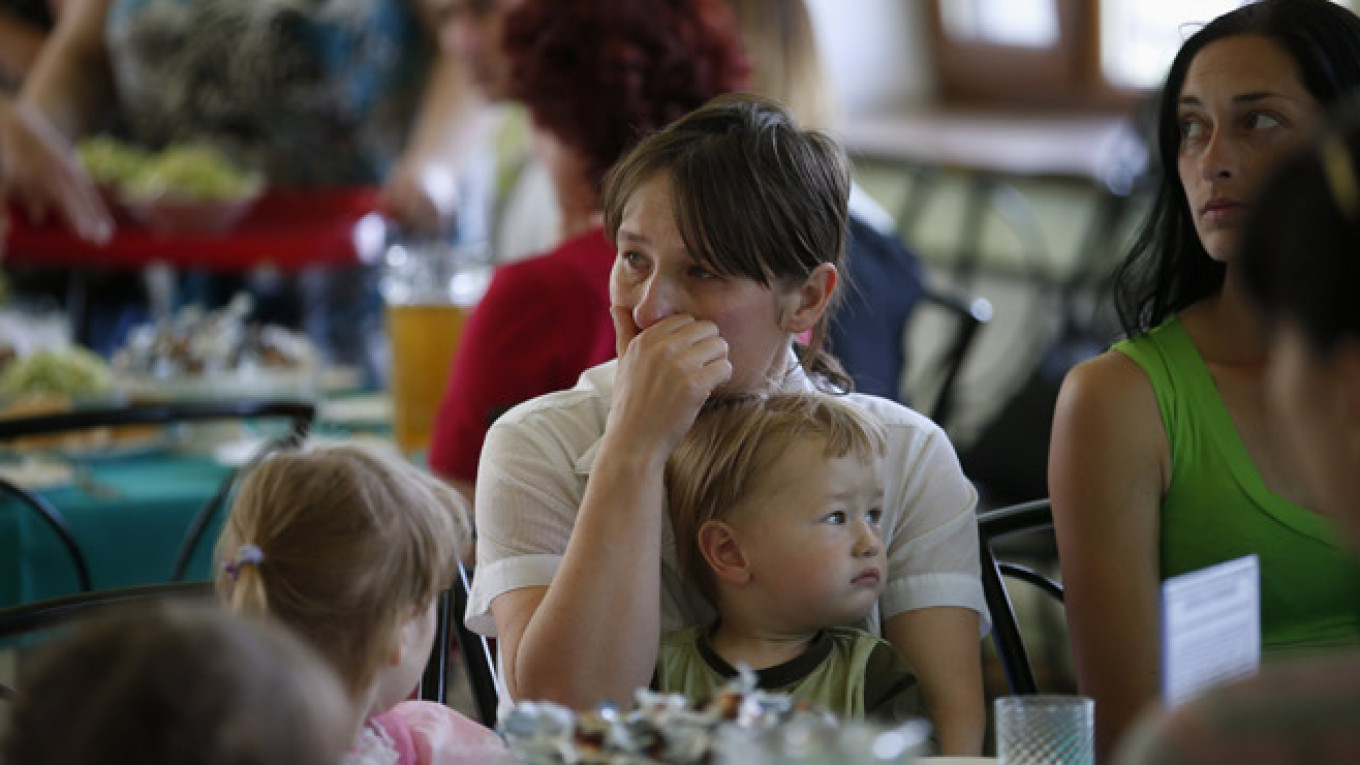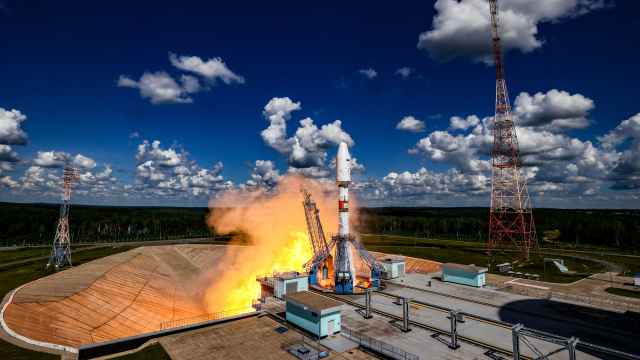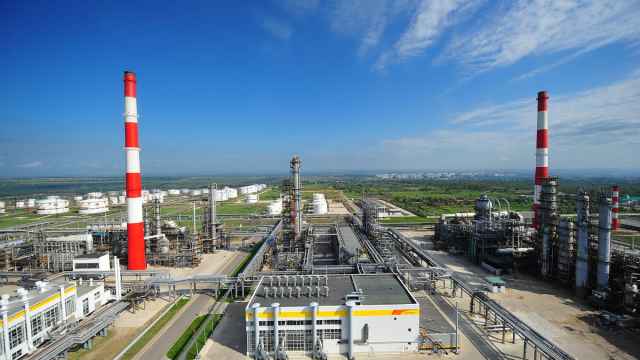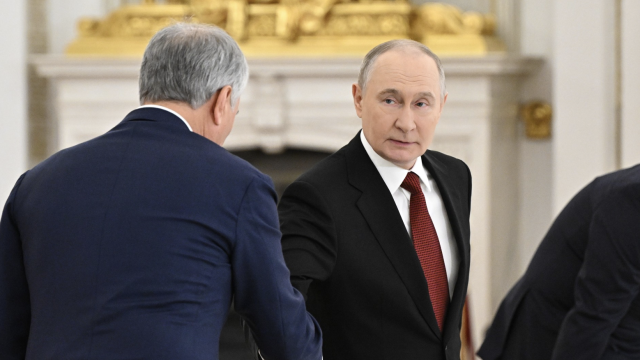The information war between Russia and Ukraine continued this week, with Russia claiming a humanitarian crisis on its border, while Ukraine denied that a flood of refugees was fleeing the conflict-torn country.
Thousands of eastern Ukrainians fled to Russia this week, Prime Minister Dmitry Medvedev said Thursday, ordering deputy prime ministers Igor Shuvalov and Dmitry Kozak to deal with the situation.
"People are frightened, and Ukrainian officials do not admit that there are humanitarian problems, talking about the absence of refugees. This is a lie, it is sad to hear it all," he said at a government meeting.
The alleged refugee crisis prompted local authorities in Russia's southern Rostov region to declare an emergency situation in nine districts bordering Ukraine. Various state facilities, including children's summer camps, are ready to host up to 2,623 Ukrainians with psychologists on site and five meals a day — all for free — the regional administration said in a statement on its website. As of Thursday, 437 Ukrainians were staying in such facilities, it said.
But the correspondent of the opposition-minded Novaya Gazeta newspaper on the ground in Rostov-on-Don said that "these numbers are greatly exaggerated."
"These Ukrainians get 21-day holiday vouchers with the whole thing arranged by [Ukraine's self-proclaimed separatist] Donetsk People's Republic," Viktoria Makarenko said in a telephone interview.
Eduard Kapov, who heads the representative office in Rostov-on-Don of the Donetsk People's Republic that is waging a war with Ukrainian troops, confirmed to The Moscow Times that he works with local Russian authorities to coordinate the transportation of Ukrainian women and children to Russia in order to provide them with a safe haven from the hostilities at home.
"Many people turn to me directly for help, but the Donetsk People's Republic itself also informs people about the opportunity to go to Russia," Kapov, a Russian citizen, told The Moscow Times on Thursday. "I am a member of the local commission organized by the [Russian] Emergency Situations Ministry, where we coordinate the situation," he said.
"We cannot do as much as we want, as a lot of our territory is still occupied by Ukraine," he said.
Russia's children's ombudsman Pavel Astakhov wrote on Twitter on Thursday that he had inspected "refugee camps" in Rostov-on-Don the day before, though there have been few illustrated reports of such camps in Russian media. State television channel Rossia-24 showed footage of families at a holiday camp, but did not include any interviews with the people shown.
Medvedev said during Thursday's government meeting that 4,000 Ukrainians have applied for refugee status at Federal Migration Service, or FMS, offices across Russia, and called the situation "unprecedented." He did not say over what period of time the applications had been received, and a request to clarify those figures sent to the FMS was left unanswered by the time of publication.
Ukraine's border control service issued a statement Wednesday saying that not a single Ukrainian had applied for refugee status in Russia and that they had observed no outflow of Ukrainians to Russia. It was not immediately clear how Ukrainian authorities could access that information, however, as applications for refuge are submitted to Russia's FMS.
Only seven Ukrainians have applied for refugee status with the Rostov branch of the FMS, the Rostov region administration press service was cited as telling Lenta.ru on Thursday.
Most Ukrainians who entered Russia in the past few days crossed the border as tourists, benefitting from the simplified travel regulations that remain in force between the two countries, Rostov region governor Vasily Golubev told The Moscow Times on Thursday.
"At first, most of these people were coming to stay with their relatives, but now we are getting some who have nowhere to stay in Russia," he said in a phone interview.
According to a bilateral agreement, Ukrainians can stay in Russia for up to 90 days out of each 180 days of the year without requiring a visa.
The Rostov region has provided 10 buses that shuttle Ukrainians from border checkpoints to vacation camps, Golubev said.
Nikolai Vdovchenko, director of the Dmitriadonovsk vacation facilities on the Azov Sea, 70 kilometers from the Ukrainian border, said 275 Ukrainians, most of them children, are currently staying in his holiday complex free of charge.
"Many of these people say they have nowhere to return to, as their houses have been shelled by the Ukrainian army," he told The Moscow Times.
"We were informed by the local district authorities on Sunday that Ukrainians would come. They began to arrive on buses from the border Monday and we expect more in coming days," he said.
See also:
Russia Received Thousands of Ukrainian Refugees in One Day, Astakhov Says
Contact the author at [email protected]
A Message from The Moscow Times:
Dear readers,
We are facing unprecedented challenges. Russia's Prosecutor General's Office has designated The Moscow Times as an "undesirable" organization, criminalizing our work and putting our staff at risk of prosecution. This follows our earlier unjust labeling as a "foreign agent."
These actions are direct attempts to silence independent journalism in Russia. The authorities claim our work "discredits the decisions of the Russian leadership." We see things differently: we strive to provide accurate, unbiased reporting on Russia.
We, the journalists of The Moscow Times, refuse to be silenced. But to continue our work, we need your help.
Your support, no matter how small, makes a world of difference. If you can, please support us monthly starting from just $2. It's quick to set up, and every contribution makes a significant impact.
By supporting The Moscow Times, you're defending open, independent journalism in the face of repression. Thank you for standing with us.
Remind me later.






